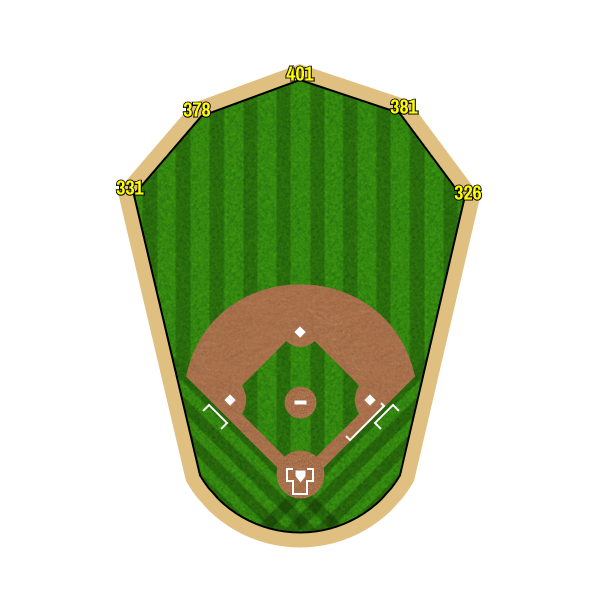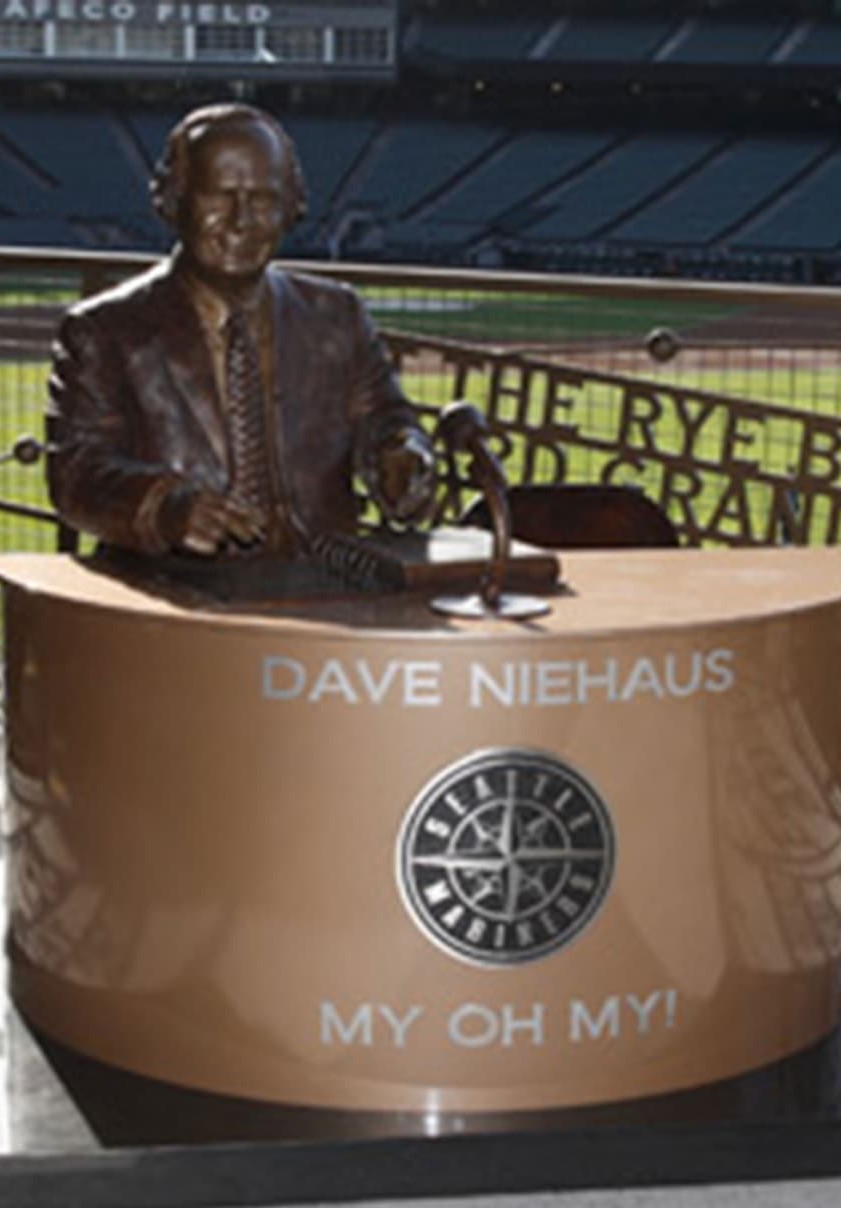T-Mobile Park – known as Safeco Field 2018 – is home to MLB franchise the Seattle Mariners. A retractable roof stadium, this Seattle ballpark is the only in MLB to host an interleague game on its opening day. It ranks sixth among MLB stadiums with a capacity of 47,929 seats and is the third biggest in the American League after RingCentral Coliseum, Dodger Stadium, and Yankee Stadium. Designed in a retro-modern style, T-Mobile Park boasts an asymmetrical field dimension and all-natural grass. Its brick façade gives a semblance of old times while fans admire the sightline and concessions for offering an exotic game-viewing experience.
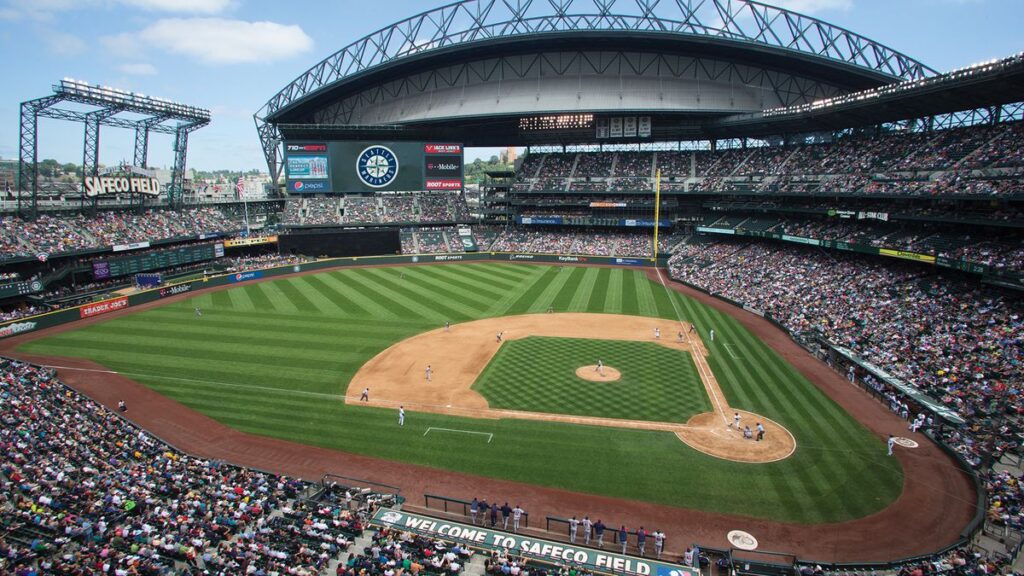
The History
The Seattle Mariners felt constrained to play at the Kingdome in the early 1990s. They threatened to relocate due to the dilapidated condition of the stadium. . But the referendum for a new stadium didn’t find the approval of King County in 1995. However, the Mariners won the American League Division Series that year and this played a role in getting the approval for the new ballpark. The Washington State Legislature agreed to public funding and construction started in 1997 at a selected site south of the Kingdome.
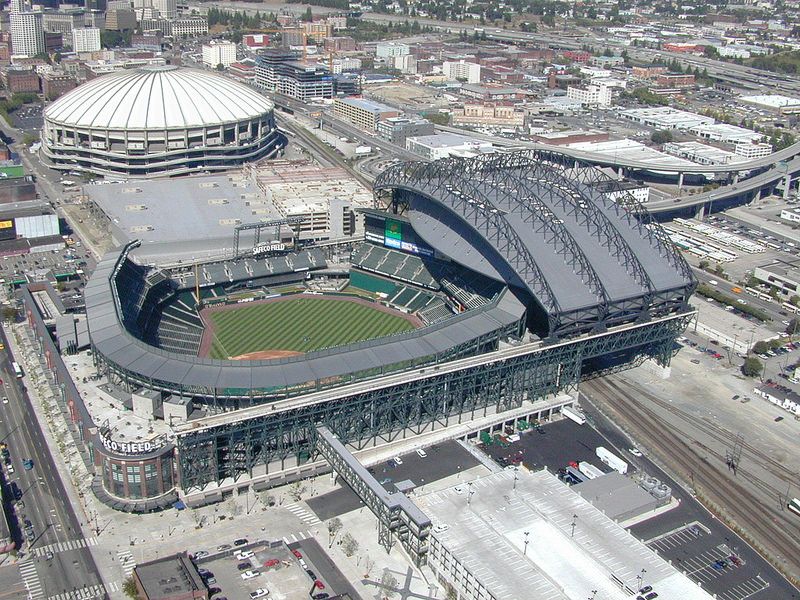
T-Mobile Park was inaugurated on July 15, 1999, soon after the All-Star break. The first game saw the Seattle Mariners losing to the San Diego Padres 2-3. Sportscaster Dave Niehaus threw the ceremonial pitch. Before the inauguration of the ballpark, Seattle-based Safeco Insurance paid $40 million to buy the naming rights in 1998 for 20 years.
Until 2013, T-Mobile Park ranked among the most pitcher-friendly ballparks. The baseball stadium underwent renovation moving its fences closer to make it more balanced that season. It also got a new 11,435-square-feet board – the largest in MLB then. As of 2022, only one MLB stadium Progressive Field (13,039 sq. ft.) has a bigger scoreboard.
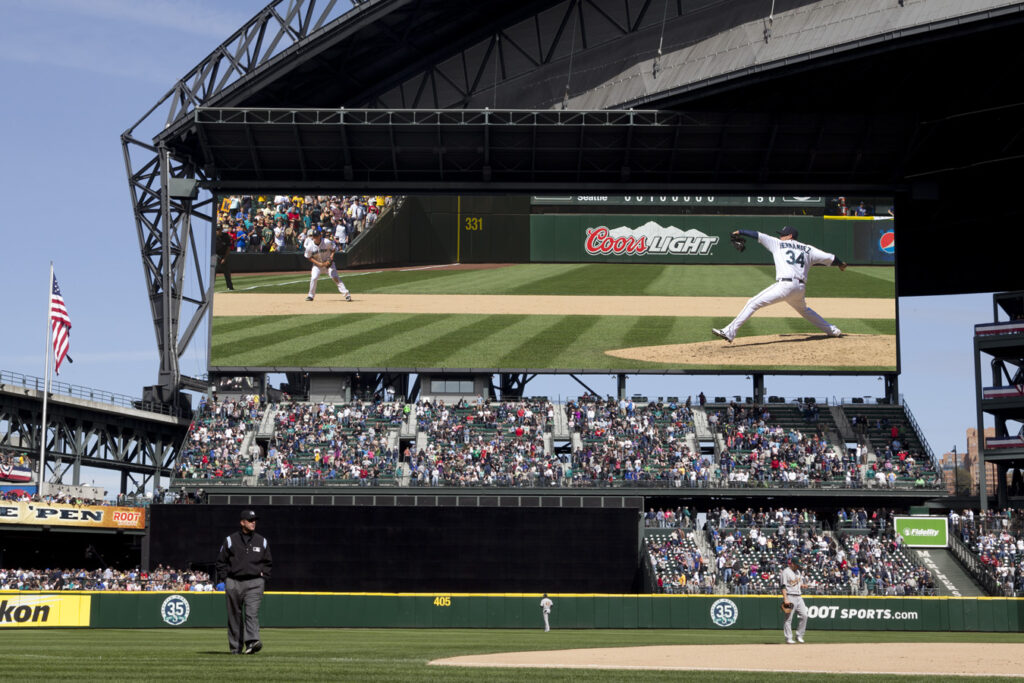
In 2007, the Mariners unveiled a poster to welcome their former great Ken Griffey Jr. The poster called the ballpark “The House That Griffey Built.” Ken was part of the inaugural Mariner team at T-Mobile Park. However, he was later traded to the Cincinnati Reds in 2000. Ken won American League Gold Glove 10 times, twice AL MVP, and 1999 Player of the Decade award while playing for Seattle for 11 seasons.
Design and Features
T-Mobile Park is the fifth-oldest example of this style and the third retro-modern ballpark built in the 1990s after Angel Stadium, Kauffman Stadium, Progressive Field, and Chase Field. Similar to baseball stadiums built in the 1950s, the ballpark has a brick façade and street-level field. It has four gates offering direct access to Home Plate, Left, Right, and Center Fields. Ticket holders can also enter the stadium through the first avenue Mariners’ team store that opens behind the bullpens.
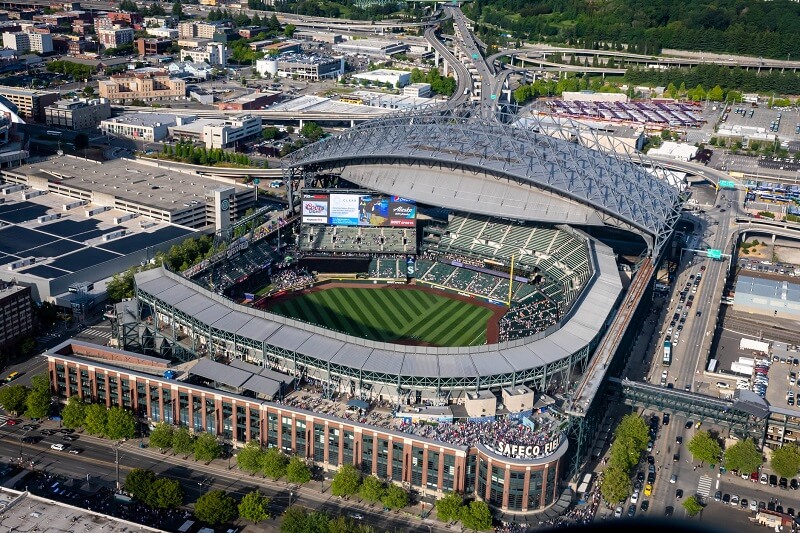
The umbrella-style retractable roof is the most unique feature of T-Mobile Park. Unlike five others, LoanDepot Park, American Family Field, Chase Field, Rogers Centre, and Minute Maid Park, its roof doesn’t offer any climate control. It is just to cover the field and stands against rain or cold at night. There are three independent sections of the roof, each placed on two parallel tracks. When the roof slides back to open the cover, it rests over railway tracks passing on the eastern side of the ballpark. It takes about 10 minutes to open or close the roof aided by computers.
T-Mobile Park has seats spread five levels, including 20,634 at Main Concourse and 16,000 at Upper Concourse. There are two bleacher sections holding 3,700 seating capacity and ramps, escalators, and elevators to reach different parts of the ballpark. The Diamond Club, the Wells Fargo Terrace Club, and 70 luxury suites are only accessible to special ticket holders. These have private concierge service, VIP parking, and private entry. Clubs have lounges, buffets, and bars. The Hit It Here Cafe is open to all before the game but only ticket holders can use it during a game.
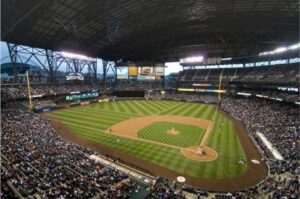
Facilities and Concessions
T-Mobile Park has several eateries on the main and upper concourses. This includes The Pen and the Food Court, which have Japanese, Thai, Chinese, American, and Spanish gastronomy on the menu. Fans have the option to have “health food” and barbecue too. The Mariners Hall of Fame has nine bronze statues of home-team greats and broadcaster Dave Niehaus. Plaques, murals, and audio-visual presentations tell fans about the contribution of each of these to the Mariners’ success as an MLB team
Adjoining the western part of T-Mobile Park is the Mariners Team Store. Its first level is dedicated to Mariners merchandise. The second level has two sections – one for a customized jersey and another for game-used items. Kids’ Clubhouse, Speed Pitch, and Moose’s Munchies only sell items exclusively made for kids. Hospital Playfield is a purpose-made baseball arena for children. Kids can meet the home-team mascot at the Moose Den.
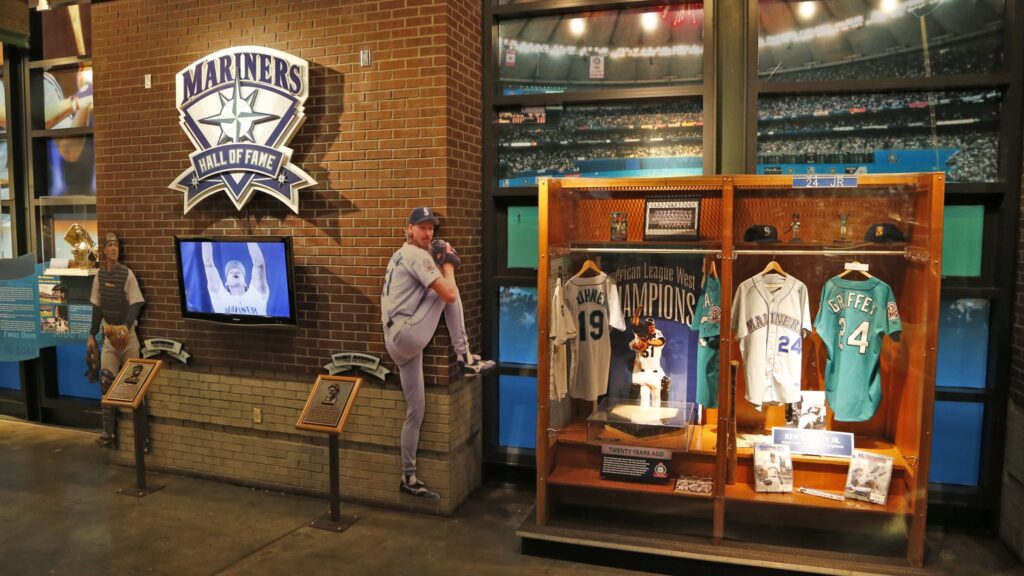
The ballpark is home to the Baseball Museum of the Pacific Northwest. It has a collection of memories of erstwhile baseball franchises of Washington, Oregon, Idaho, Montana, and British Columbia. There is also an educational showcase detailing the different aspects of baseball kits, such as types of gloves, making of baseballs, materials used to create bats, etc. A prop of the T-Mobile park outfield at the museum enables fans to have photos resembling outfielders.
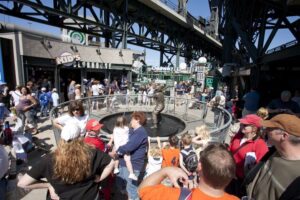
Artworks and Statues
- The Tempest is a chandelier located near the home plate gate. It comprises 1,000 resin baseball bats.
- Six Pitches is a showcase of metal sculptures in six different pitching positions.
- Home plate rotunda’s 27-foot mosaic depicts baseball’s history.
- The Mitt is a 9-feet-tall bronze artwork of a baseball glove.
- Quilts is another artwork that has on display used logos of MLB franchises made from recycled license plates.
- T-Mobile Park gates also have several steel cutouts of players in various playing positions.
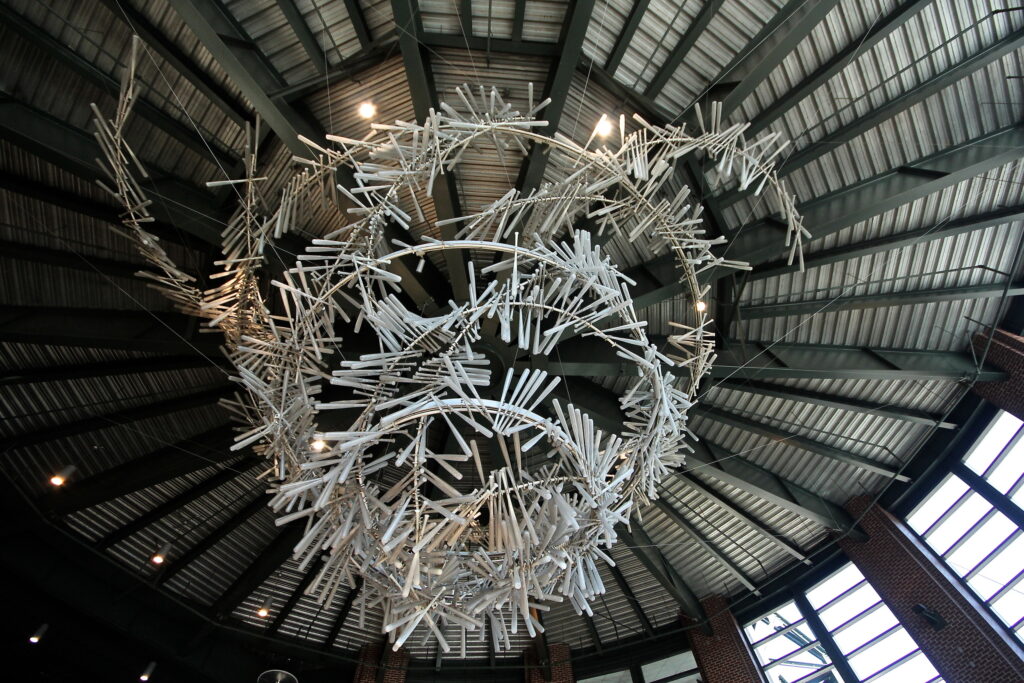
Purely Baseball Things To Know
- The first game saw the San Diego Padres beat the Seattle Mariners 3-2 before a home crowd of 47,000.
- In 2001, the ballpark hosted the MLB All-Star Game.
- On July 17, 1999, two days after the inauguration, Mariners’ Raul Ibanez, hit the first-ever grand slam at T-Mobile Park against the San Diego Padres. Russ Davis also hit the first home run at the ballpark.
- Jay Buhner score his 23rd two-homer at the ballpark on July 25, 2000, to make his 300th homer and beat the Oakland A’s.
- In October 2000, the Mariners made a clean sweep of three-game series against the Chicago White Sox.
- In 2001, with their 116th victory, the home team recorded the highest number of games won in a season.
- On October 1, 2004, Ichiro Suzuki of the Seattle Mariners scored his 258th hit at T-Mobile Park to broke the 84-year old record of the maximum number of hits in a season. George Sisler had 257 hits in 1920. Suzuki ended the 2004 season with 262 hits.
- Dan Wilson returned from the DL list for a day on September 30, 2005, and caught Jamie Moyer for an inning before retiring that day.
- In his second stint with the Mariners, Ken Griffey Jr scored his 400th Mariner homer on April 15, 2009. It was his 613th overall home run.
- The Chicago White Sox pitcher Philip Humber achieved the first no-hit, perfect game at T-Mobile Park on April 22, 2012.
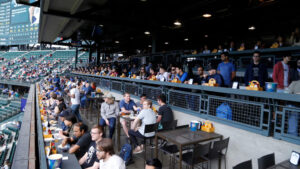
- The Mariners achieved the first team no-hit game at the ballpark against the Los Angeles Dodgers on June 9, 2012. Felix Hernandez had the third no-hit, second perfect game at the stadium. He achieved this while playing against the Tampa Bay Rays on August 15.
- In 2015, Hisashi Iwakuma threw another no-hitter against the Orioles to become the second Japanese MLB player to achieve this.
- A ball hitting the roof is considered fair or foul based on it’s the type of place it has below. If a player catches it while descending, the batter is given out.
- The Defining Moment mural is a testimony to the epic double hit by Edgar Martínez to come back and win the game on October 8, 1995.
- The night of April 16, 2009, saw a game remembered for spectacular hitting and stellar pitching by the Mariners. The home team routed the LA Angels 11-3.
- Former Mariner Randy Johnson returned to T-Mobile Park with Arizona Diamondbacks on July 20, 1999, and won the first shutout at the ballpark.
Non-Baseball Events
- College baseball: T-Mobile Park is a regular venue for college baseball.
- College football: The short-lived Seattle Bowl college football championship began at this ballpark.
- Soccer: Before the opening of the soccer-only Lumen Field, the baseball stadium used to host soccer games, including CONCACAF Women’s Gold Cup in 2002.
- Wrestling: The 2003 WrestleMania XIX attracted the biggest sports crowd to the stadium.
- Concerts: T-Mobile Park had its first private concert in 2008 and a public concert in 2013. Paul McCartney performed there in the first public concert. Since then Beyonce, Jay-Z, Pearl Jam, Foo Fighters, and many others have held concerts there.
- Events: The ballpark hosted several events, including Microsoft’s annual employee meet, presidential campaigns, religious congregations, and graduation ceremonies.

